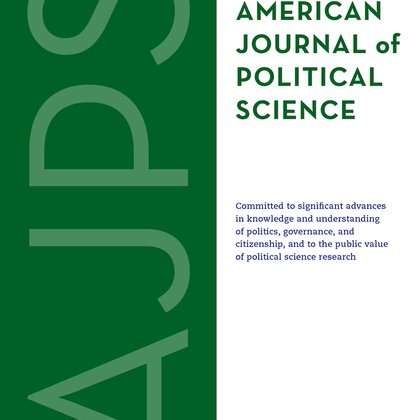
Thomas Tichelbaecker
@ttichelbaecker
Followers
265
Following
370
Media
1
Statuses
68
PhD candidate @PUPolitics studying political parties and affective polarization.
Joined November 2016
Thinking about immigration from a cultural perspective heightens distrust of political opponents, as discussed in our recent @BJPolS. Might interest scholars of affective polarization and ideology, as well as those analyzing open-ended survey questions. https://t.co/x18PZtT4n8
0
15
66
NEW - Beyond Observational Relationships: Evidence from a Ten-Country Experiment that Policy Disputes Cause Affective Polarization - https://t.co/tusCYm0jv5 - @NoamGidron, James Adams (@ucdavis), Will Horne (@ClemsonUniv) & @ttichelbaecker
#OpenAccess
0
9
18
Don’t miss your chance to read new Cambridge Element The European Ideological Space in Voters' Own Words by @NoamGidron and @ttichelbaecker Free access available until 31 January. https://t.co/Dwbbz88Q8b
#cambridgeelements #management
0
8
20
Very happy that our @CUP_PoliSci Element is now out! @NoamGidron and I review the two dimensional framework and how it resonates with ordinary citizens! Check out Noam's 🧵 to see what we find! 👇
We often define the ideological space in terms of the economic and cultural dimensions; how does this resonate with ordinary citizens? This is the question @ttichelbaecker and I explore in a new Element, analyzing answers to open-ended survey questions 🧵 https://t.co/L9JVV2xpEI
3
5
36
New Cambridge Element The European Ideological Space in Voters' Own Words by @NoamGidron and @ttichelbaecker is now free to read for 4 weeks! https://t.co/KuIXnySnTU
#cambridgeelements #management
0
16
28
Check out our new database for German local, state, and federal election results! https://t.co/SzG73BtWxq
german-elections.com
The German Election Database provides comprehensive datasets of local, state, and federal election results in Germany for research on electoral behavior. Bundestagswahlergebnissen, Landeswahlergebn...
If you are looking for comprehensive election data in Germany, we've got you covered. The German Election Database (GERDA) provides local, state, and federal election results at the municipality level between 1990 and 2021.
2
28
60
If you are looking for comprehensive election data in Germany, we've got you covered. The German Election Database (GERDA) provides local, state, and federal election results at the municipality level between 1990 and 2021.
1
27
126
In his job market paper, @AnthonyTaboni analyzes judicial decision making under uncertainty and evaluates why circuit splits happen using both formal theory and an original data set of cases of first impression in the U.S. Courts of Appeals.
0
7
19
In her dissertation, @hpenatzer identifies and explains how and why internationalized territories subvert state sovereignty.
0
2
26
In his dissertation, @Lkrashinsky examines white working-class voting in Canada and the United States. A wide-ranging and multi-method study that employs surveys, experiments, and in-depth interviews.
1
10
34
In his job market paper, @RobOldham24 explores how crisis events affect incentives and lawmaking outcomes on Capitol Hill. He finds that polarization has had far weaker effects on crisis lawmaking than on more routine lawmaking.
0
6
24
In her job market paper, @LinaSkgd examines how an incumbent can effectively overthrow a democratic regime to stay in power. She uses a natural experiment based on Louis-Napoleon’s 1851 coup and highlights the role of information flows during democratic breakdowns.
0
10
51
Elaine Yao studies how groups make decisions in weakly institutionalized environments. Her job market paper studies why, without formal rules to guide collective action, some internecine conflicts resolve in a united front, while others end in mutually harmful stalemates.
0
3
21
In her dissertation, Jeongmin Park examines why postwar governments impose discriminatory labor regulations targeting women. She argues that states may deliberately undermine the competitiveness of women's labor to reintegrate returning male veterans. https://t.co/kPBnZBphLK
0
7
18
Highly recommend to check out this new exciting paper by my brilliant colleagues @christian_baehr, @FionaBare and @VHeddesheimer who look at how exposure to climate change changes companies' lobbying behavior!
1/ New Pre-Print 🚨 When do firms engage in climate politics? We (@christian_baehr @FionaBare) argue that lobbying occurrence, intensity, and targeting depend on the multifaceted potential impacts of climate change on firms. A short 🧵 https://t.co/nGwQrUlFRl
0
0
7
We hope that this data will enable other researchers to enhance our knowledge about affective polarization in a comparative context! Code and data used in the study are published and available via dataverse: https://t.co/mgW1q8uHB7 4/4
0
0
1
Our results show that this correlation between out-party and out-partisan affect is strongest among respondents in Spain & Germany and weakest among respondents in Greece & the UK. 3/4
1
0
2
Based on novel data from 10 countries and 11000 individuals, we examine the relationship between two measures capturing hostility towards out-parties (feeling thermometer) and out-partisans (social distance). We find a robust relationship across and within individuals. 2/4
1
0
1
Delighted that this article on measures of affective polarization across countries joint w/ @NoamGidron, Will Horne and Jim Adams is now available online in POQ 🥳. https://t.co/iP0TOkXywP What is this article about? A short 🧵: 1/4
2
26
71
How do parties react to minority candidates? And what role does past voter behavior play in it? Our study, with @daniel__auer and @ttichelbaecker, on this is now out @AJPS_Editor: https://t.co/f2UqJRTMzw 1/6
onlinelibrary.wiley.com
Immigrants and other minorities are underrepresented in politics in most Western democracies. We argue that strategically acting party gatekeepers who update their nomination strategies based on...
3
14
70







